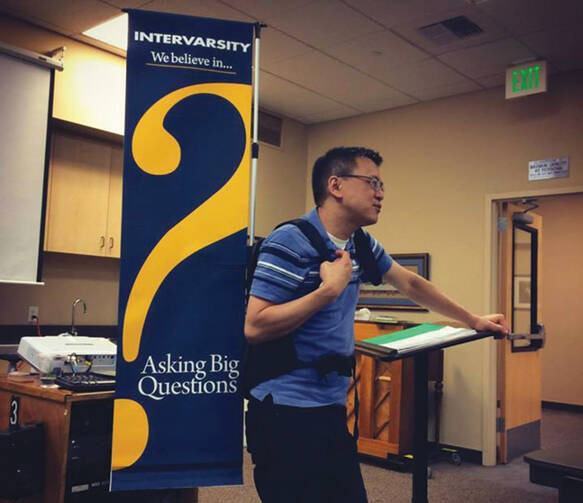InterVarsity Christian Fellowship organizations in the massive, 23 campus, 450,000 student California State University system have to abide by new nondiscrimination rules or else become “de-recognized” as official student groups. The change comes as a result of a decision in 2011 by system officials to enforce an “all comers” policy for student club membership.
Mike Uhlenkamp, C.S.U. director of public affairs, explains, “The idea is that if you are a member of the journalism club you cannot require your membership or leadership to be exclusively student journalists. Same with the Republican Clubs, etc.” If a group wants official school recognition, any student must be free to attend and to lead it. But InterVarsity groups require that student leaders assent to a Christian creed. And that, says Uhlenkamp, is “discriminatory against those who are not of that faith.”
Greg Jao, spokesperson for InterVarsity, expressed his disappointment with C.S.U.’s decision. They have been negotiating the policy shift for three years. “In general we affirm the nondiscrimination policy; we believe every student should have a safe, welcoming diverse experience on campus,” he says. “But we believe a religious group should be led by members who are representative of that religion.”
Uhlenkamp reports that C.S.U. officials have suggested ways in which InterVarsity could be true to itself and maintain recognized status. “They could have a vote, require leaders to attend a minimum number of meetings, pay dues, be in good standing with the club for a specific amount of time or take a skills-based test.”
“I’m really grateful that they’re trying to think of ways around it,” says Jao. “But what Cal State is saying is ‘Remove the overt religious beliefs from your requirements.’ ….It’s a form of dishonesty—a terrible model for students in terms of integrity.”
When asked whether Newman clubs that have Mass on C.S.U. campuses could be de-recognized if non-Catholic attendees are asked not to receive Communion, Uhlenkamp said, “From a broad perspective, I think it would be acceptable [to deny Communion]. But I’d have to take it to lawyers.”
InterVarsity and C.S.U. differ on the tangible consequences of de-recognition. Uhlenkamp says, “De-recognized groups are welcome to participate on campus. They’re just not going to get recognition and the perks that come with that, including discounted use of facilities, faculty advisement and access to student funding.”
But InterVarsity insists this is a much bigger change than the C.S.U. is letting on. The rates to reserve rooms will effectively price them out of operating on some campuses.
While Uhlenkamp believes that the only real question will be “where the group wants to meet and whether they want to work with the campus to find a meeting place—I can choose to live in a million dollar house or I can choose to pay less,” the reality seems to bear out InterVarsity’s concerns.
At Sonoma State, where InterVarsity has operated since 1962, the cheapest fee the group could find for its previously free weekly meeting in a campus conference room adds up to an unusually high $28,000 a year.
For C.S.U., the fundamental issue is California state law, which requires “full and equal access…to any program or activity” that is sponsored by the state or involves state funding.
But at the end of the day, says Jao, the real question is, “Is this good policy? I’m not sure I want public universities or the government to reach into the inner workings of religious groups and say this is how you have to choose leaders if you’re going to have equal access to every student group on campus.”








